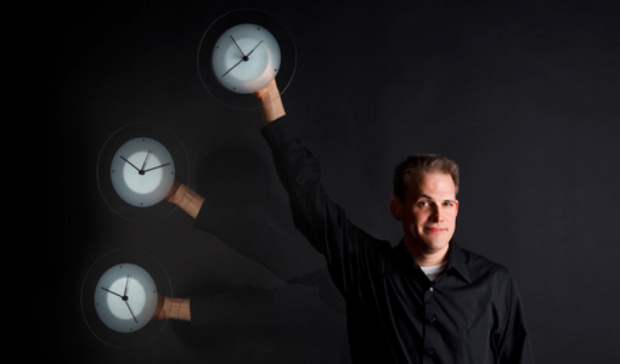Three years ago, I had an unusual experience at my neighborhood gym on Chicago’s north side. I had been doing 30-minute workouts on the elliptical machines regularly for months, and I typically kept close track of my progress. I knew when I was halfway done, when I had five minutes left, and when my 30 minutes expired. Usually, the 30 minutes dragged by rather slowly.
One day, however, I didn’t realize my workout time was finished until I had exercised a full 10 minutes beyond my usual half-hour. I was shocked – how could I have lost track of so much time?
I’m not the type of person who enjoys running in place for its own sake, and I typically had to force myself to exercise for the full 30 minutes. On this occasion, however, time seemed to fly by. When I stepped off the machine, it indicated that I had worked out 33 percent longer than usual and burned a corresponding number of extra calories. What’s more, I felt that my workout had been easier and more enjoyable than usual.
Had I suddenly become stronger and more athletic than ever before? Doubtful. Or maybe I had suddenly started to enjoy my workouts more – “time flies when you’re having fun,” right? Being the skeptic that I am, I wasn’t convinced this was the answer, either. I tried to find alternative reasons behind the sudden change in my exercise experience but didn’t start to discover them until my next visit to the gym – when the same thing happened again.
I started to think about what was different about those two workouts from every other visit I had made, when the answer struck me: While I ordinarily read books or watched TV while working out, I had switched to reading full-size magazines in the past week. Was National Geographic making my workouts more enjoyable and effective? In a roundabout way, yes.
One subtle difference between reading a paperback novel and a magazine on this particular model of elliptical machine was that the magazine covered up the machine’s workout timer, whereas the smaller books I had been bringing did not. What’s more, my gym’s nearest clock was over my shoulder, meaning I had lost all time cues while reading my magazine. In the absence of clocks – and the presence of a decent distraction courtesy of my favorite magazine – time flew by, and I was having more fun.
Being a behavioral scientist by training, I recognized that there was something potentially powerful about this observation. I also recognized that forgetting about the clock shouldn’t make my workout physically easier or less painful. Why would something as simple as losing track of time make my workouts more pleasant? I had a hypothesis, and I wanted to test it.
Psychological research has uncovered innumerable insights about how the mind works, but one of the major overarching themes is this: The brain is a wonderfully adept sense-making machine. That is to say that when our brains receive vague information, they try to categorize this information in a familiar way. This is why we sometimes see faces in ambiguous patterns, such as a face on the surface of the full moon. Similarly, when we see someone engaging in perplexing behavior such as turning red in the face and hopping, our mind immediately generates explanations for such behavior – sometimes drawing conclusions about the person (e.g., “He must be mad!”), and sometimes drawing conclusions about the situation (e.g., “He must be choking on something!”).
The brain’s quick, reflex-like “sense-making” habits may occasionally lead to incorrect interpretations of the world around us, but the general scientific consensus is that this feature of the mind allows us to think and respond quickly to matters that are either too urgent or too trivial to warrant long, careful examination.
"What if taking steps to help employees lose track of time could make mundane tasks more tolerable?"
My situation at the gym fit this model well. I had an unusual experience – time had seemed to fly by during my workout – and it wasn’t quite clear why. My mind naturally sought to quickly settle upon a plausible explanation. The answer, of course, was provided by a well-known adage: When trying to answer the question of “Why did time fly by today?,” my mind concluded, “I must have been having fun.”
In reality, this was a false conclusion. I had completed the exact same workout as I had done many times before. My choice of reading material had changed, but my magazine was no more “fun” than the paperback novel I had completed during my last workout. I had worked just as hard, and perspired just as much, as I had in every preceding trip to the gym. The only difference was that, at the end of my workout, I was surprised to discover that more time had passed than I expected. And my feeling that my workout had been more fun, I now hypothesized, were purely due to my mind’s attempts to explain away a confusing experience.
Armed with my observations, I proposed the following hypothesis to a colleague in my department at the University of Chicago: When people feel that time flew by, regardless of what actually caused those feelings, they will conclude that they were enjoying themselves more. We soon set out to test this hypothesis with a series of experiments using participants from the campus community.
In the first experiment we conducted, we recruited individuals to participate in a study described as an investigation of basic cognitive performance. Participants had to read through pages of product manuals, and their task was to underline any word containing a doubleletter combination (for example, letters contains double Ts, and Tommies contains double Ms). Not exactly a rollicking time, but it wasn’t too unpleasant either, and that’s exactly what we wanted.
Each participant was going to spend precisely 10 minutes on the underlining task, but that’s not what we told them: Half the time, we told participants that they would be spending five minutes on the task, and half the time we told participants that they would be doing it for 20 minutes. To make the deception possible, we conducted the study in a room that didn’t have a clock and collected participants’ wristwatches and electronic devices at the door, stating that it was crucial for our research that such distractions be set aside. As the icing on the cake, our research assistant carried a stopwatch and, upon telling a participant to begin, would start it with a beep before leaving the room. When she returned 10 minutes later, she held a different but identical stopwatch displaying exactly the amount of time she had said the task would require—either five or 20 minutes.
Given that they had spent 10 minutes on the task, participants who believed that they had been underlining words for 20 minutes were surprised at how quickly time “flew.” Meanwhile, those who believed that the task only lasted five minutes were equally surprised at how slowly time “dragged.” Of course, in reality, both sets of participants had spent exactly the same amount of time on exactly the same task. Our question was: How did our subtle manipulation influence their experience?
After they completed the word-underlining task, we asked our research participants to evaluate it. Participants who were made to feel that time “flew by” during the task gave more positive (or, at least, less negative) ratings than did their counterparts on a variety of dimensions, including how enjoyable, challenging and fun the task was, and their own interest in participating in another word-underlining study again sometime in the future. Just like my experience at the gym, these participants were surprised by an apparent distortion in their perceptions of time. Their minds sought a quick explanation, and the easiest conclusion was based on the common belief that “time flies when you’re having fun.”
Participants who felt that time dragged likely concluded that it must have been a pretty miserable task, whereas participants who felt that time flew concluded that it must not have been so bad after all.
To make sure our hypothesis was accurate, we ran several other experiments. Sometimes, we used a pleasant task (like listening to a favorite song), and sometimes we used a very unpleasant task (like listening to mechanical noises). Sometimes we used our “stopwatchswapping” method to mislead participants about time’s passage, while other times we displayed a rigged timer that would tick off the seconds slightly faster or slightly slower than normal. In every case, he result was the same: When people were surprised to find out time had passed by more quickly than they thought, they subsequently rated experiences more positively.
Being on the business faculty here at St. Thomas, I’m inclined to think about how this interesting little phenomenon can relate meaningfully to our everyday lives. For example, our word-underlining task was selected, in part, to be analogous to the repetitive, mundane tasks that accompany many employees’ everyday work experiences. What if taking steps to help employees lose track of time could make such tasks more tolerable? Or what if marketers could utilize these sensemaking features of human psychology to enhance people’s enjoyment of positive experiences (such as watching a movie in the theater or taking a weekend vacation) and to reduce the unpleasantness of negative experiences (such as waiting in line, or exercising)?
Surely such applications could have benefits for business, but it also could have clear benefits for the common good. After all, there are seemingly few costs to helping people feel greater enjoyment of activities without fundamentally changing the activities themselves.
Research into these more practical aspects of our findings is still in its developmental stages. One issue is that deceiving people to make them feel that time flew by is obviously both an ethical problem and a practical one; however, psychological research has identified some factors that can speed up or slow down an individual’s time perception without deception. For example, greater physiological arousal (such as the stimulant effects of caffeine) may lead to feelings that time has flown by, as can just about anything that keeps one’s mind off the clock.
Rest assured, researchers like me are trying to further explore the implications of the mind’s perception of time and enjoyment. While you wait to learn of our next findings, I might suggest that you enjoy a cup of coffee, remove your wristwatch and try to distract yourself from time in whatever way works best for you. And the next time you’re working out at the gym, you might consider bringing along the latest issue of St. Thomas magazine.
About the Author: Aaron Sackett is an associate professor of marketing in the Opus College of Business.





